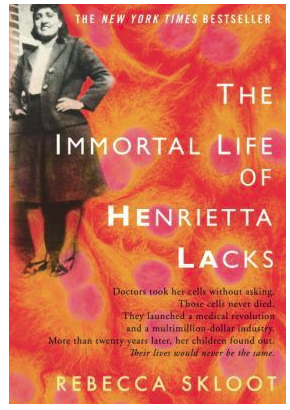
The Immortal Life of Henrietta Lacks
Rebecca Skloot
Synopsis: Goodreads
Her name was Henrietta Lacks, but scientists know her as HeLa. She was a poor Southern tobacco farmer who worked the same land as her slave ancestors, yet her cells—taken without her knowledge—became one of the most important tools in medicine. The first “immortal” human cells grown in culture, they are still alive today, though she has been dead for more than sixty years. If you could pile all HeLa cells ever grown onto a scale, they’d weigh more than 50 million metric tons—as much as a hundred Empire State Buildings. HeLa cells were vital for developing the polio vaccine; uncovered secrets of cancer, viruses, and the atom bomb’s effects; helped lead to important advances like in vitro fertilization, cloning, and gene mapping; and have been bought and sold by the billions.
Yet Henrietta Lacks remains virtually unknown, buried in an unmarked grave.
Now Rebecca Skloot takes us on an extraordinary journey, from the “colored” ward of Johns Hopkins Hospital in the 1950’s to stark white laboratories with freezers full of HeLa cells; from Henrietta’s small, dying hometown of Clover, Virginia — a land of wooden slave quarters, faith healings, and voodoo — to East Baltimore today, where her children and grandchildren live and struggle with the legacy of her cells.
Henrietta’s family did not learn of her “immortality” until more than twenty years after her death when scientists investigating HeLa began using her husband and children in research without informed consent. And though the cells had launched a multi-million-dollar industry that sells human biological materials, her family never saw any of the profits. As Rebecca Skloot so brilliantly shows, the story of the Lacks family — past and present — is inextricably connected to the dark history of experimentation on African Americans, the birth of bioethics, and the legal battles over whether we control the stuff we are made of.
Over the decade it took to uncover this story, Rebecca became enmeshed in the lives of the Lacks family—especially Henrietta’s daughter Deborah, who was devastated to learn about her mother’s cells. She was consumed with questions: Had scientists cloned her mother? Did it hurt her when researchers infected her cells with viruses and shot them into space? What happened to her sister, Elsie, who died in a mental institution at the age of fifteen? And if her mother was so important to medicine, why couldn’t her children afford health insurance?
Intimate in feeling, astonishing in scope, and impossible to put down, The Immortal Life of Henrietta Lacks captures the beauty and drama of scientific discovery, as well as its human consequences.
Richard’s comments
The reader gets two books for the price of one with The Immortal Life of Henrietta Lacks.
Book one is a scientific/medical history pertaining to cells taken from the body of a black woman named Henrietta Lacks. It is a journalistic narrative about these cells, their development, their commercialization and the scientific discoveries associated with this exploration and analysis. The depth and range of the discoveries are awesome. The impact on the medical and scientific world, absolutely amazing. The scientific facet of this story has a legal side: how the cells were managed and handled without legal permission or personal authorization from the woman behind the story is incredible. The medical world today owes a tremendous debt, even obliquely to Henrietta Lacks. As medical and scientific developments unfolded, the ancillary legal aspects opened legal doors to greater safeguarding of the rights of people in relation to their bodies while they are alive as well as after they die.
Book one is a great story unto itself.
Book Two is a story of racism and exploitation of the impoverished, a story which is repeatedly universally ad nauseam but which should be repeated ceaselessly. Henrietta Lacks was diagnosed with cancer and what was discovered about her cells became a major story from a scientific-medical view. However, the story becomes a major one when the discoveries are made about her cells. These cells were one in a billion, maybe even greater odds. Their value seemed to grow exponentially as more was learned in the lab but as this research developed the commercialization became more important. The durability and potential value of these cells grew as more was learned. The tragedy was that no one in the Lacks family was informed of the commercial value of the research. Others benefited tremendously, increasingly as more knowledge was learned. Yet, the Lacks family received a cent of financial compensation to what eventually became a hugely profitable business, the commercialization of Henrietta’s cells.
Why did this family not share in the treasure of the mother’s/sister’s uniqueness? The story becomes one of clear and obvious exploitation. This family was uneducated. They were poor. They were black. The laws protecting patients against such exploitation were rudimentary at best. This family knew nothing of legal recourse, even if they had the money to pursue it. Sadly, the world and history of profit, greed and personal selfishness are endlessly repeated sinful violations in our world. This second book relates this story with accompanying sadness and emotional decent.
 A book about cellular growth and research should have a very limited attraction. Rebecca Skloot deserves all the acclaim and recognition she has received for making such a clinical story come to life. Her research gave rise to the second book, the tragedy of racial abuse and human exploitation. She has written a book that draws readers into sympathizing with the Lacks family, a family to whom is owed indescribable gratitude and unbridled appreciation. Our society benefits from this woman beyond any reasoned rationale or justification.
A book about cellular growth and research should have a very limited attraction. Rebecca Skloot deserves all the acclaim and recognition she has received for making such a clinical story come to life. Her research gave rise to the second book, the tragedy of racial abuse and human exploitation. She has written a book that draws readers into sympathizing with the Lacks family, a family to whom is owed indescribable gratitude and unbridled appreciation. Our society benefits from this woman beyond any reasoned rationale or justification.





